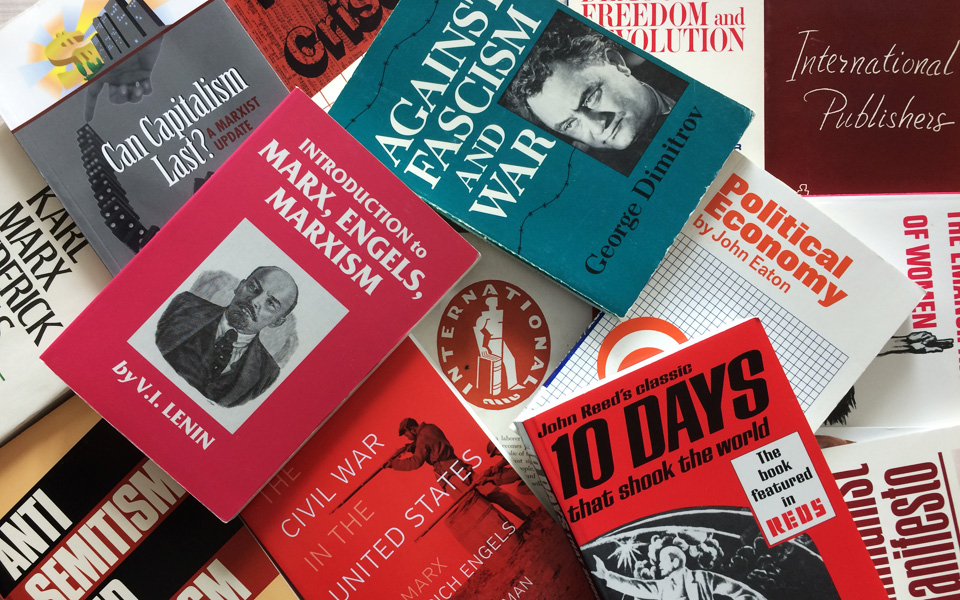
NEW YORK—As International Publishers prepares to celebrate 100 years of publishing next year, People’s World sat down with its President Gary Bono and Vice President Tony Pecinovsky for a chat concerning its history, what’s happening with the imprint nowadays, and thoughts about the future.
Eric Gordon: International Publishers used to be the only, or at least one of very few, Marxist or left-wing publishers in the United States. Now there are several. Even some mainstream publishers issue popular books with a Marxist point of view. What niche does IP have in this marketplace? What might distinguish an IP book from something you might see from one of these other publishers? In other words, what place does IP occupy in the publishing universe?
Tony Pecinovsky: Well, International Publishers is not only one of the first Marxist publishers in the U.S., it is also one of the longest continually publishing Marxist publishers in the U.S. This is an important distinction. In fact, next year, 2024, marks our 100th anniversary, and we’re co-hosting a day-long seminar at NYU’s Tamiment Library later this year in preparation for this milestone moment. Scholars and activists from across the country will present papers on IP’s legacy, and those papers will be turned into a book as part of our centennial celebration.

We’re also gearing up for the next phase of our history. After all, we’re well into the 21st century now, right? And—just a little context—IP has survived for a century despite repeated, concerted efforts to destroy us, to make us illegal. That is to say, to make it illegal to publish books on Marxism-Leninism. So, our legacy is part of what makes us unique. Our legacy is part of our niche.
Gary Bono: We do indeed occupy a special place in the publishing universe, but I don’t want PW readers to draw the wrong conclusion. IP is a small publisher, but—like the Communist Party USA—our influence has always been much larger than our actual size. We are home to some of the most important Marxist classics, books that help to set the pace of struggle—for workers’ rights, for African-American equality, for peace, international solidarity, and socialism—in the 20th century. Herbert Aptheker’s American Negro Slave Revolts, or Philip S. Foner’s monumental 11-volume History of the U.S. Labor Movement, or W.E.B. Du Bois’s autobiography, or the five-volume Life and Writings of Frederick Douglass, or Alphaeus Hunton’s Decision in Africa, I could go on and on.
Pecinovsky: In short, IP titles helped to shape and define the contours of struggle through much of the 20th century.
Gordon: What are some of IP’s current “best sellers?” And why are those titles resonating with readers?
Bono: Well, our current—and longest running “best seller”—is The Communist Manifesto. Typically, our IP edition sells around 40,000 copies per year. Of course, 2023 is the 175th anniversary of the Manifesto and we hope to publish an Anniversary Edition with a new cover and new foreword in the coming months. Something to really celebrate the Manifesto!
A number of Marxist classics sell really well—Gramsci’s The Prison Notebooks, Marx and Engels’s The German Ideology, Lenin’s Left-Wing Communism, and quite a few others.
Pecinovsky: Our “best seller” from a contemporary author would be Gerald Horne’s The Counter-Revolution of 1836. All of Dr. Horne’s books sell very well. Also, selling very well right now is American Trade Unionism by William Z. Foster. As you may know, this book is credited by some of the Amazon workers in Staten Island for providing the organizational and political guidance that led to their historic victory last year. It is also being used by Starbucks workers during some of their organizing trainings. I’m sure Foster would be proud!
Bono: Yeah, I think these books are resonating because of the extraordinary times we’re living in. Young people are organizing—Amazon workers, Starbucks workers, etc.—like never before. There is an upsurge and interest in socialism. It’s only natural that they look to the successful organizing strategies and tactics of the past. And who better than Foster? He, and the CPUSA, helped to spur the CIO into action in the 1930s. Their initiatives led to the greatest upsurge in working-class victories in U.S. history. So, of course, the works of Foster are going to resonate. I’m happy to say, we recently republished a biography of Foster titled Working Class Giant.
Pecinovsky: Similarly with Gerald Horne’s The Counter-Revolution of 1836. People see the fascist-like attacks taking place all around them. They see the continued assault on Black lives, trans lives, reproductive rights. They see what’s happening in Florida with DeSantis and the Republicans basically deciding school curricula. Trump! MAGA! They fear that fascism is on the rise, and they are looking at the historical parallels—settler colonialism, slavery, genocide of the Native Americans, Jim Crow, etc. They are seeing today’s fascist-like attacks—Jan. 6, 2021, for example—as a continuation of a white, settler-colonial counter-revolution. Gerald’s book helps us understand what’s happening today not as an aberration, but rather as a continuation. And this is important if we are to intellectually and ideologically arm ourselves for the struggles ahead.
Gordon: Does IP’s association with the Communist Party work for it or against it—in terms of getting books reviewed, overall sales, soliciting writers? Or do you think most people don’t know or don’t care about this?
Pecinovsky: You know, in today’s world, I don’t think most readers are aware of the historic links between IP and the CPUSA. Of course, that history is there. The role of Alexander Trachtenberg, James S. Allen, and Betty Smith—all CPUSA members—in leading IP is important. However, it is also important to note that IP is a separate entity. It has—and will continue to—publish books by Communists, and have a special relationship with the CPUSA. However, its readers and authors are much, much broader than the CPUSA.
Bono: Just briefly I would add, do not at all understate the role of Abraham Heller, Trachtenberg’s partner in the early days. He largely supported IP monetarily in the early years, including paying Trachtenberg’s salary, before it had established itself as the premier Marxist publisher in the U.S. Also, there is the role of Jim Allen. You can’t forget him. During the post-WWII Red Scare, there was a concerted effort made to put IP out of business. It was Jim Allen who stepped in at that point and by heroic effort saved the company. He also brought out many new titles, recruited new authors, and was the driving force behind publication of the 50-volume Marx-Engels Collected Works. If Trachtenberg is considered to be the founder, Jim Allen should be considered the “refounder.” What you see today is largely thanks to Jim Allen. There’s more about this history on our website.
Pecinovsky: I think what distinguishes IP from some other publishers is that it refuses to fall into the anti-communist trap. Instead, it sees Communists—Communism, Marxism-Leninism—as a legitimate current within the broader people’s movement for socialism.
Of course, as the Organization of American Historians pondered some years ago, a “Red Taboo” remains in U.S. historiography. This Red Taboo impacts who’s willing to review IP books. It impacts sales. It also impacts who is willing to write for IP—just consider the issue of academic tenure! Though I’m happy to say that is changing.
Gordon: How is IP attracting new authors? What can IP offer to writers? Why would they want to be published by IP?
Pecinovsky: IP is proactively contacting new authors. For example, I was just at the annual African American Intellectual History Society conference in Charlotte, N.C. While there—presenting a paper on challenging anti-communist myths—I also attended several workshops and panel discussions with an eye toward identifying possible IP authors.
In fact, we have several new, unique manuscripts in the works by non-Communist scholars writing on the history of Black women Communists, on Claudia Jones, on the publications Working Women/Women Today, among other topics.
For the first time in a long time, authors are also reaching out to IP—offering their manuscripts to us. I think this is because they know IP—know our history, our legacy—and they want to be associated, even loosely, with that legacy of resistance against capitalism and for socialism. In some ways, they see us making a comeback!
Bono: Also, we offer authors several benefits that traditional publishers cannot compete with. We do provide modest royalties. Of course, that’s not why people write for us. We also have a very quick turnaround. For example, we can take a finished manuscript and have it in print within six months. That’s unheard of in the academic world. With most academic or university presses, it’s a two- or three-year process from manuscript to finished book.
Gordon: Where do you see the strengths of IP’s catalogue? The weaknesses?
Pecinovsky: IP has a lot of strengths. For example, we are the North American publisher of the 50-volume Marx-Engels Collected Works. And let me interrupt with this commercial break! Almost half of the 50 volumes are now on sale for 70% off! So, if you’re looking to jump start your Marx-Engels Collected Works, now is the time. Use coupon code MECWSale when you check out. And now back to our regular programming:

Other strengths are IP’s books dealing with the struggle for African-American equality and Black liberation. I mentioned Gerald Horne earlier. We have a new book by Gerald coming out soon titled Revolting Capital dealing with racism and radicalism in Washington, D.C., from 1900 to 2000. Of course, prominent Communists, such as Alphaeus Hunton and Doxey Wilkerson, factor heavily into his analysis.
Also, as I mentioned earlier, we have new manuscripts on Claudia Jones and Black women Communists organizing in the Midwest during the Great Depression. We’ll eventually bring Henry Winston, James Jackson, and Claude Lightfoot’s books back into print. We just need new forewords for these titles. Of course, our Herbert Aptheker, Frederick Douglass, and W.E.B. Du Bois titles are great examples. My book The Cancer of Colonialism: W. Alphaeus Hunton, Black Liberation, and the Daily Worker, 1944-1946 is an example of a more recent title focused on equality and liberation. So, as I said, books dealing with the struggle for equality and liberation—this has historically been a strength of IP’s.
However, one of the things that I noticed when I first started working for IP was the imbalance in our catalogue when it comes to books by and about women, women’s struggles, working-class feminism, the struggle of Black women, and other women of color. This is a major weakness in our catalogue. Similarly, IP has nothing currently on the struggle for LGBTQ equality—another weakness. And we only have a few books on the struggle for a sustainable environment.
Bono: Absolutely, Tony. New blood, new issues, new concerns. These are major weaknesses that have to be addressed. They should have been addressed a long time ago! As part of our effort to attract new authors and solicit new manuscripts, titles dealing with these topics are front and center.
Pecinovsky: Hey, but let me mention something else, a strength! We invested quite a bit recently in building a new website, much more user-friendly, accessible, you can readily find anything you’re looking for, easy payment and shipping. Check it out.
Gordon: I do have a personal interest in this question, but if you think about it, translations are actually a big part of IP’s catalogue—Marx, Engels, Lenin, Gramsci, and lots of others! Are you seeking new work to be translated into English?
Pecinovsky: Yes, and I’m glad you asked. IP, like the larger Communist movement, is internationalist. We are part of an international movement. It’s in our name! We are actually part of what is called the International Union of Left Publishers (IULP), which translates and shares books from all parts of the world. Our next IULP project is the publication of a selection of essays and articles by Ruth First, a leader of the South African Communist Party who was assassinated by the apartheid regime.
Bono: As far as translations go, we are always looking for books that fulfill our mission. And you, Eric, know that very well! The eight-book Manuel Tiago series is a wonderful example of the types of projects IP is excited to take on. Tiago was the pen name for Álvaro Cunhal, longtime leader of the Portuguese Communist Party. The series is a wonderful literary example—based on a lifetime of experience—of how to organize underground resistance to fascism. These books are a must-read, especially in today’s world, where populist fascism is rearing its ugly head. And I want to publicly thank you for bringing this project to us. I know our Portuguese comrades are thrilled that all of Cunhal’s fictional work is now available in English for the first time!
Gordon: Thank you, Gary, I really appreciate that. As we speak, the last and most epic book in the series, Until Tomorrow, Comrades, is at the printer.
Pecinovsky: Last year we published Cheng Enfu’s China’s Economic Dialectic. With a new Cold War brewing, it is more important than ever that we try to understand the world from China’s perspective and do our part to foster international solidarity and peace.
Gordon: Amen! But let me follow up with this: Would IP want to pursue more fictional writing?
Pecinovsky: Absolutely! Personally, I read more history—more non-fiction—than fiction. But I know a lot of people prefer fiction. In fact, we just received a manuscript submission for a series of anti-capitalist sci-fi novels. These could be really interesting. Now, they have to be read, edited, etc. There is a process.
The point is: People develop and strengthen their class consciousness in a multiplicity of ways. Not everybody wants to read Marx, Engels, and Lenin. Not everybody wants to read history—which is what your guy Álvaro Cunhal understood so well. So, this could be another avenue to develop and foster an IP reader base—people who see IP as their go-to place to find anti-capitalist literature.
Gordon: I’m conducting this interview with you for People’s World. Is there anything you want to say particularly to our readership?
Pecinovsky: People’s World—and its predecessor papers—has always supported IP. We appreciate your support. We hope PW readers will continue seeing IP as part of the larger PW family.
Bono: And who knows, maybe someone reading this interview will feel inspired and submit a manuscript to us. I hope they do.
We hope you appreciated this article. Before you go, please support great working-class and pro-people journalism by donating to People’s World.
We are not neutral. Our mission is to be a voice for truth, democracy, the environment, and socialism. We believe in people before profits. So, we take sides. Yours!
We are part of the pro-democracy media contesting the vast right-wing media propaganda ecosystem brainwashing tens of millions and putting democracy at risk.
Our journalism is free of corporate influence and paywalls because we are totally reader supported. At People’s World, we believe news and information should be free and accessible to all.
But we need your help. It takes money—a lot of it—to produce and cover unique stories you see in our pages. Only you, our readers and supporters, make this possible. If you enjoy reading People’s World and the stories we bring you, support our work by donating or becoming a monthly sustainer today.










